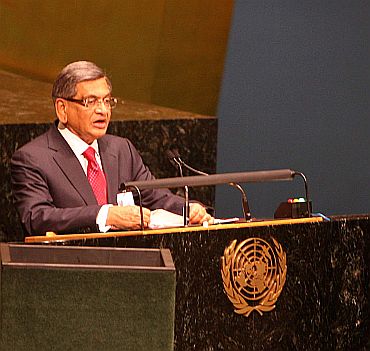 | « Back to article | Print this article |
 Contending that the United Nations Security Council should reflect contemporary realities, India on Wednesday sought 'urgent reform' of the powerful UN body to effectively meet emerging global challenges.
Contending that the United Nations Security Council should reflect contemporary realities, India on Wednesday sought 'urgent reform' of the powerful UN body to effectively meet emerging global challenges.
"The first step has to be the reform of the Security Council," External Affairs Minister S M Krishna told the UN General Assembly, noting that 'an overwhelming majority' of nations wanted expansion of both permanent and non-permanent seats.
"It is imperative that we take these negotiations to an early and logical conclusion," he added.
India expects to join the Security Council as a non-permanent member following the election in October.
"The changes in the global geo-strategic order since 1945 have barely been reflected in the most vital of the UN's organs, charged with the maintenance of international peace and security," he said.
"Developing countries contribute almost all the troops that are part of the UN's peacekeeping presence worldwide. Yet, their voice on the council's high table on decisions relating to international peace and security is barely audible," the minister said.
He pointed out the example of Africa, which has no permanent member in the Security Council, though it is seized of conflicts in the continent.
On the issue of terrorism, Krishna noted that the United Nations needed to adopt a comprehensive treaty to tackle the killing of innocent civilians by extremist organisations.
"To defeat this scourge, it is imperative for the global community to build on international cooperation and take concerted action against terrorists and their sponsors," the minister said, noting that there remained 'gaps in the international legal framework against terrorism.'
"The Comprehensive Convention on International Terrorism is designed to fill these gaps," he added.
Turning to the issue of climate change, Krishna stressed that developed countries needed to take the lead in fulfilling their various commitments, which would help in combating the crisis facing the global community.
"Clearly, with their greater capacity to contribute, the developed countries must take a lead in this process and fulfill their obligations, not only in terms of more ambitious commitments for reducing greenhouse gas emissions, but also in helping developing countries in their mitigation and adaptation efforts," the minister said.
"In India, despite our huge developmental challenges, we are doing everything possible, within the limitation of our own resources, to contribute to the global action plan on climate change through an ambitious National Action Plan," he said.
Image: External Affairs Minister S M Krishna addresses the United Nations General Assembly on Wednesday
Photograph: SnapsIndia